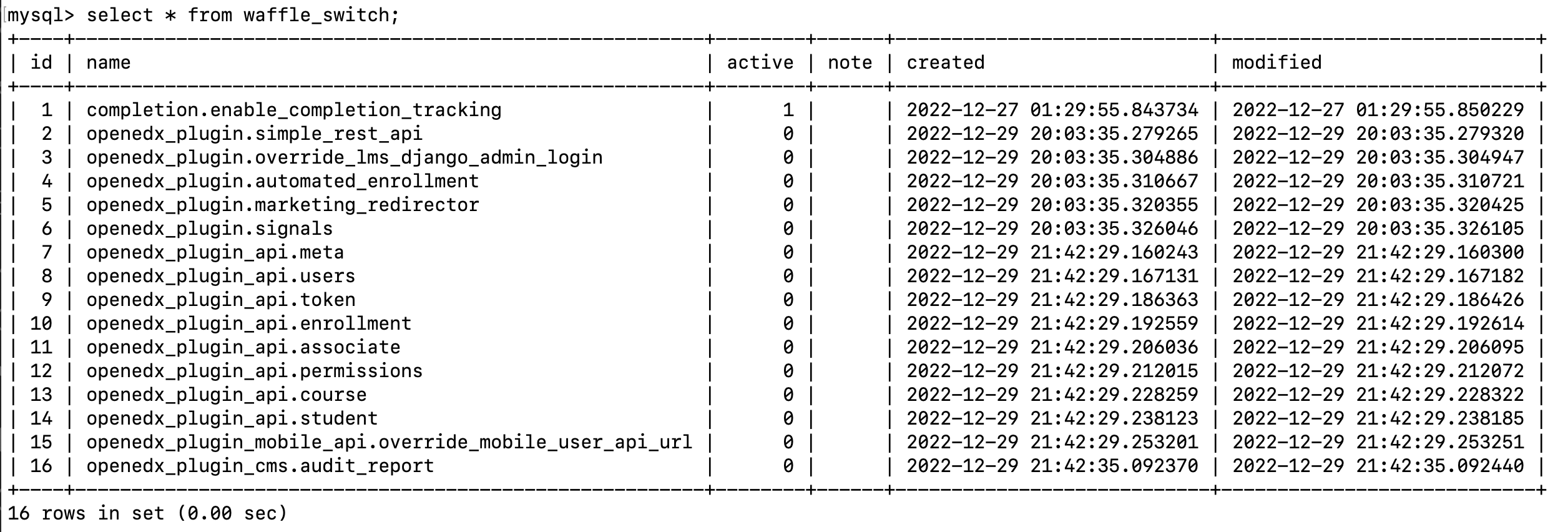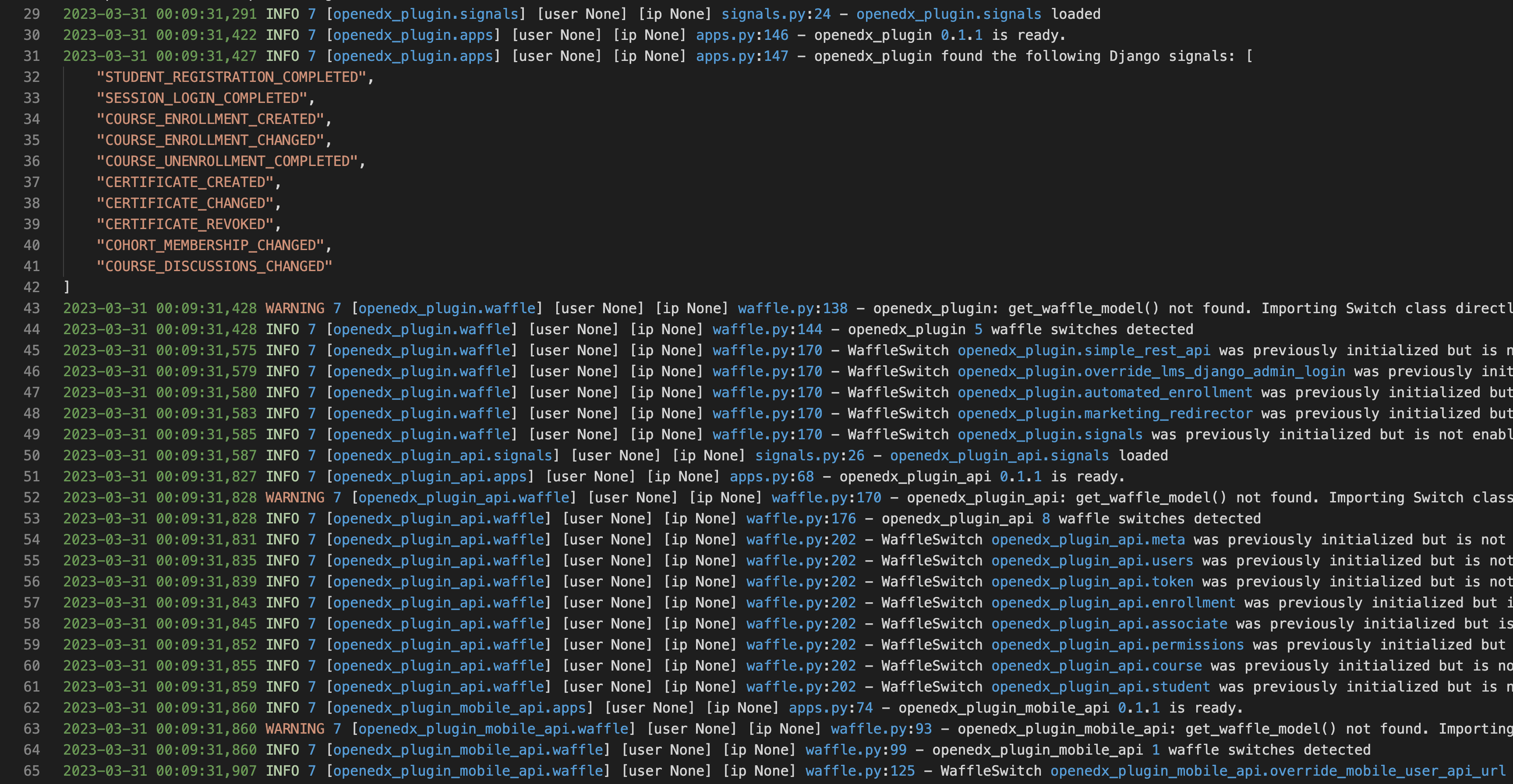A curated collection of code samples for extending the functionality of an Open edX installation using its built-in plugin architecture.
Technical features that are showcased in this repo include:
- Open edX Django configuration settings
- Open edX Django urls
- Open edX Django logging
- Open edX Django signals
- Open edX Django RestFramework custom api
- Django app setup
- Django models
- Django and Mako templating
- Django static assets
- Django Admin
- Django middleware
- Django manage.py custom commands
- Django Waffle flags
- Python environment variables
- How to bundle multiple plugins in a single pip package
- How to redirect Open edX urls in lms and cms to endpoints created in this plugin
- How to automatically initialize Django model data during app startup
- Adding unit tests to plugin code
- Semantic version control
- Pre-commit with linting by flake8 and black, both of which are configured to match the opinionated styling that you'll find in Open edX repositories
- pip configuration, requirements, constraints, setup.py, pyproject.toml
- Publishing to PyPi
Demonstrates how to create an all-in-one Open edX plugin, with a heterogeneous collection of custom feature additions, including:
- A custom third party authentication Oauth2 client backend.
- Extending new user registration functionality. Demonstrates how to leverage Django Signals to extend basic native Open edX operations.
- Extending the login functionality
- Implementing a rest api from scratch that is accessible from an LMS url.
- Advanced Internationalization: customizing static page links based on the language locale setting
Implements a full-featured REST API which is built from snippets of Open edX's built-in rest api libraries. Demonstrates the following:
- Best practices with Django RestFramework for Open edX
- Adding custom URL endpoints to LMS
- Adding Django Admin views
- Creating custom Django models for your plugin
- How to create custom entries in the openedx app log
- How to leverage Django Signals to create customized event-driven features
- How to implement Waffle Switches to control optional features at run-time
Implements a custom course audit report in Course Management Studio that depends on a backend Python process to iterate the course content. This process is highly instructive about the Open edX course object hierarchy. This plugin demonstrates the following:
- Adding custom URL endpoints to Course Management Studio
- Adding Django Admin views
- Adding custom manage.py commands to CMS
- Creating custom Django models for your plugin
- How to create custom entries in the openedx app log
- How to leverage Django Signals to create customized event-driven features
- How to implement Waffle Switches to control optional features at run-time
- Advanced usage of Mako templating within an Open edX plugin
- How to programatically iterate and inspect course content
- How to leverage Open edX object caching
Implements a modified version of the Open edX LMS Mobile REST API. This plugin illustrates best practices for modifying edx-platform source code without actually forking this repository. Demonstrates the following:
- How to implement Django middleware to modify the destination of existing LMS url endpoints
- Best practices with Django RestFramework for Open edX
See Installing extra xblocks and requirements
tutor config save # to ensure that tutor's root folder system has been created
echo "git+https://github.com/lpm0073/openedx-plugin-example.git" >> "$(tutor config printroot)/env/build/openedx/requirements/private.txt"
cat "$(tutor config printroot)/env/build/openedx/requirements/private.txt"
tutor images build openedx
tutor local quickstart
# you'll also need to run this on your very first install
# -----------------------------------------------------------------------------
# 1. run migrations
tutor local run lms ./manage.py lms makemigrations
tutor local run lms ./manage.py lms migrate
tutor local run cms ./manage.py cms makemigrations
tutor local run cms ./manage.py cms migrate
# 2. add configuration data to custom models
tutor local run lms ./manage.py lms openedx_plugin_init
tutor local run lms ./manage.py lms openedx_plugin_api_init
tutor local run lms ./manage.py lms openedx_plugin_mobile_api_init
tutor local run cms ./manage.py cms openedx_plugin_cms_init-
Each of these four Open edX plugins use django-waffle to toggle features on and off. While edx-platform also uses waffle switches, you should note that they separately manage a wrapper project named edx-toggles, and therefore the source code in this repo interacts with both of these.
-
Waffle switches in each of these four plugins are automatically initialized. You'll therefore find the switches in the LMS Django Admin console (admin/waffle/switch/) of your Open edX installation. Additionally, you'll find the raw MySL database records in the waffle_switch table

-
Look for app startup entries in the LMS app log for diagnostics information about the state of each waffle switch

Documentation is available here: Documentation
To get community support, go to the official Open edX discussion forum: https://discuss.openedx.org.
We welcome contributions! openedx-plugin-example is part of the cookiecutter-openedx project. Pull requests are welcome in all repos belonging to this organization. You can also contact Lawrence McDaniel directly.
- Use the same virtual environment that you use for edx-platform
- Ensure that your Python interpreter to 3.8x
- install black: https://pypi.org/project/black/
- install flake8: https://flake8.pycqa.org/en/latest/
- install flake8-coding: https://pypi.org/project/flake8-coding/
# Run these from within your edx-platform virtual environment
python3 -m venv venv
source venv/bin/activate
cd /path/to/edx-platform
pip install -r requirements/edx/base.txt
pip install -r requirements/edx/coverage.txt
pip install -r requirements/edx/development.txt
pip install -r requirements/edx/pip-tools.txt
pip install -r requirements/edx/testing.txt
pip install -r requirements/edx/doc.txt
pip install -r requirements/edx/paver.txt
pip install pre-commit black flake8
pre-commit install- run
blackon modified code before committing. - run
flake8 . --count --select=E9,F63,F7,F82 --show-source --statistics - run
flake8 . --count --exit-zero --max-complexity=10 --max-line-length=127 --statistics - run
pre-commit run --all-filesbefore pushing. see: https://pre-commit.com/
To avoid freaky version conflicts in prod it's a good idea to install all of the edx-platform requirements to your local dev virtual environment.
- requirements/edx/base.txt
- requirements/edx/develop.txt,
- requirements/edx/testing.txt
At a minimum this will give you the full benefit of your IDE's linter.





